During a visit to an Asian market in Tokyo, Bui Thanh Tam was surprised to see Japanese people lining up to buy doner kebab, while Vietnamese bread was absent.
"I was surprised, because I thought Vietnamese bread had a balanced flavor and was also healthier," said Bui Thanh Tam, 32, founder of the famous Banh Mi Xin Chao brand in Japan, about his visit to Tokyo as a final-year economics student in 2015.
Vietnamese bread is currently "taking Europe by storm" and is one of the best street foods in the world. Realizing that bread only appeared sporadically in a few small shops in Japan, the young man from Quang Nam contacted his brother Bui Thanh Duy to discuss the idea of creating the brand "Xin Chao Bread".
The name came to Tam when he saw that traders in an Asian market often guessed the nationality of passersby to greet them. When they saw Tam passing by, they would say "Hello!", which made a deep impression on him. "In Vietnamese culture, everyone will know the first word 'Hello', like the English 'Hello', the French 'Bonjour', or the Japanese 'Konichiwa'," Tam explained.
Duy, 5 years older than Tam, lived in Osaka at that time and had just gotten married. Hearing his sister's idea, he discussed with his wife to save the wedding money to realize the ambition of bringing Vietnamese sandwiches to conquer the Japanese.
Coming from a farming family in the countryside of Quang Nam, the two brothers' families were not well off, but they were very supportive of Duy and Tam's determination. The two brothers borrowed money from everywhere, saving up two billion VND to prepare to start a business.
"I bet my strength, intelligence, youth, future, even the future and stability of my brother's family on the project, so I had to put all my effort into it, carefully calculate every small step and stay optimistic," Tam told VnExpress .
To compete fairly with other businesses in the Japanese F&B market, Tam was determined to build a professional image and products from the beginning, aiming to establish a chain of stores. Right from the beginning, his bread products had a complete brand identity.
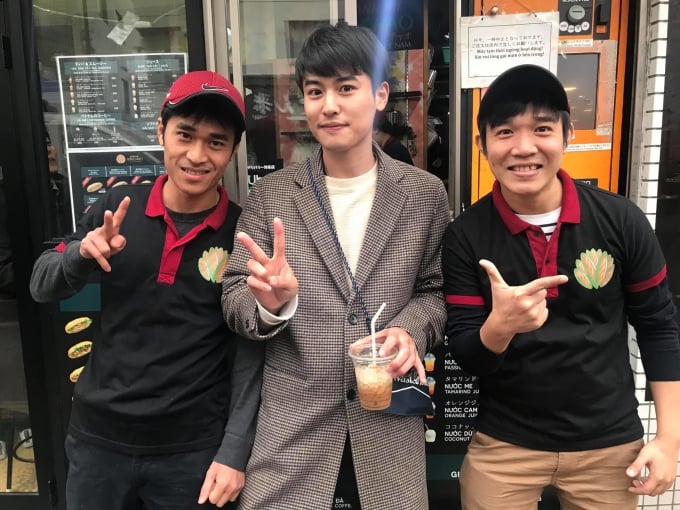
Bui Thanh Tam (right) and his brother Bui Thanh Duy (left) take photos with Japanese customers at the Xin Chao Bread shop. Photo: Xin Chao Bread
But when they started working, the two brothers quickly encountered their first challenge when approaching a strict market like Japan. In this country, foreigners who want to apply for a business license must have a Japanese person as a guarantor, to prevent the businessman from "fleeing" back to his home country when he loses money.
Duy and Tam convinced the Japanese professor who taught them in college to guarantee their store opening. "The teacher even joked: 'If anything happens, I'll probably have to sell my house to pay off your debt,'" Duy recalled.
At the end of 2016, more than a year after coming up with the idea, Duy and Tam opened their first banh mi shop in Takanadobaba, Tokyo with 5 employees, including the two brothers. Their banh mi was based on Hoi An standards, with grilled pork, sausage, and lighter dishes for locals such as chicken salad and buttered shrimp.
Tam said that food safety standards in Japan are extremely strict, from the appraisal stage to customer evaluation. Imported meat must be frozen at the highest level, and vegetables used 100% from supermarkets, all must be declared and kept strictly.
The hardest ingredient to find was the bread. The brothers had to contact more than 50 factories to find a satisfactory product, because most Japanese factories had never made Vietnamese bread with a crispy crust and a dense, soft inside. They were also hesitant to cooperate with a young business that could not guarantee sales.
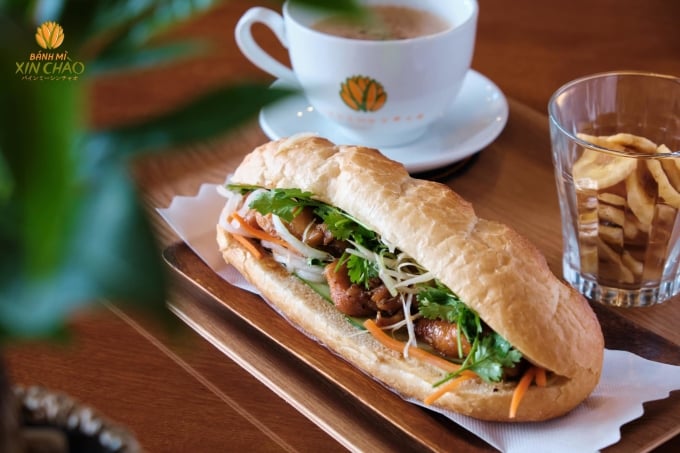
Grilled pork bread is the best-selling dish at Banh Mi Xin Chao. Photo: Facebook/Banh Mi Xin Chao
Both selling and managing, the two brothers worked continuously, sleeping only 1-2 hours a day on a piece of cardboard on the floor of the shop. "It was an unforgettable memory, but for us it was just a small challenge," Tam said, adding that the biggest problem was securing financial resources for the business.
After more than 4 months of business, Tam graduated from Yokkaichi University in Mie, with his thesis on the startup process of Banh Mi Xin Chao being the best in the department that year. Chunichi , one of the 4 largest newspapers in Japan, came to the store to interview the two brothers. The article caused a big stir, attracting many Japanese diners to experience it, creating the first premise for the brand's development.
In July 2019, when their finances and operations were gradually stable, the two brothers decided to open a second location in Asakusa, one of the most crowded districts in Tokyo. The two also took great care and invested in the Vietnamese space at the restaurant, with the desire to bring Vietnamese culture and cuisine closer to the Japanese people.
But Covid-19 struck later that year, causing everything to "seem to collapse." "The Asakusa area is normally full of tourists, but at the height of the pandemic, the streets were deserted," Tam recalled of the period when Tokyo imposed a lockdown to prevent the pandemic.
To adapt to the situation, the two brothers exploited the compact, portable nature of banh mi to transform, promote take-out sales through delivery apps, and at the same time apply many incentives to retain customers.
The Japanese government and the Tokyo government have also implemented many policies to support small and medium-sized enterprises during the pandemic, helping Banh Mi Xin Chao gradually recover. "Japan is very generous, providing monthly support, making us more confident in bringing banh mi to Japanese diners," Tam said.
Many Japanese people were impressed and amazed by the sandwich, because they had never tasted a sandwich that was crispy on the outside, soft on the inside, and full of flavor. "Many Japanese customers eat bread almost every day," Tam said.
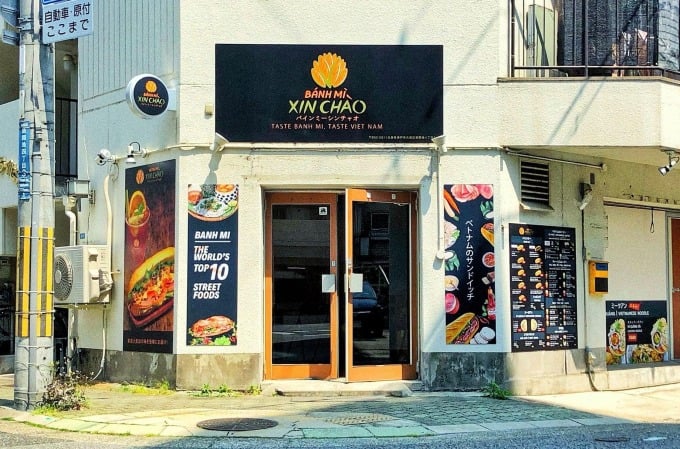
Xin Chao Bread Shop in Kobe City, Japan. Photo: Facebook/Bui Thanh Tam
After the pandemic, Duy and Tam promoted the franchise model, helping Banh mi Xin Chao grow continuously by 170% over the past years with the slogan "Taste bread, taste Vietnamese flavor". In 2022, the two brothers achieved a revenue of 1.6 million USD with 15 branches across Japan.
The brothers applied the Cloud Kitchen model, placing a central kitchen in Tokyo to process and supply raw materials to establishments throughout the Kanto region, as well as selling additional dishes such as Quang noodles, pho, coffee, and sweet soup.
During his visit to Japan from November 27-30, President Vo Van Thuong, his wife, Tokyo Governor Koike Yuriko and leaders of major Japanese corporations visited and dined at Xin Chao Bread in Asakusa.
The President was delighted and proud to enjoy Vietnamese cuisine in Japan, witnessing many young overseas Vietnamese making efforts to seize opportunities, create new values, and help connect people of the two countries through culinary culture.
That is also the meaning that Banh Mi Xin Chao pursues, Tam said. "In addition to being a place to connect people far from home, to find a bit of Vietnamese culture through a loaf of bread, we want to change the Japanese people's perspective, that in addition to being hard-working and diligent, Vietnamese people are also very good at business," he said.
President Vo Van Thuong and Tokyo Governor Koike Yuriko dined at the Xin Chao Bread restaurant in Asakusa, Tokyo. Video: Xin Chao Bread
Duc Trung
Source link


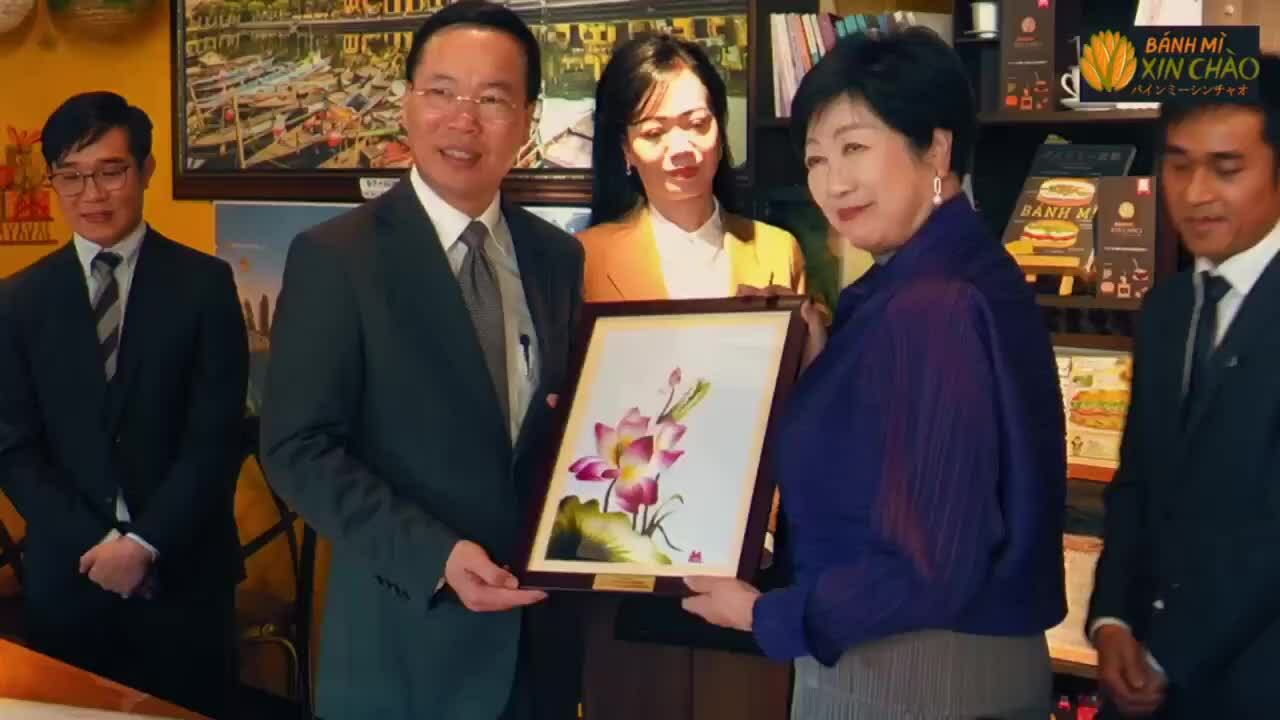
![[Photo] National Assembly Chairman Tran Thanh Man chairs the meeting of the Subcommittee on Documents of the First National Assembly Party Congress](https://vphoto.vietnam.vn/thumb/1200x675/vietnam/resource/IMAGE/2025/5/8/72b19a73d94a4affab411fd8c87f4f8d)

![[Photo] General Secretary concludes visit to Azerbaijan, departs for visit to Russian Federation](https://vphoto.vietnam.vn/thumb/1200x675/vietnam/resource/IMAGE/2025/5/8/7a135ad280314b66917ad278ce0e26fa)


![[Photo] President Luong Cuong presents the decision to appoint Deputy Head of the Office of the President](https://vphoto.vietnam.vn/thumb/1200x675/vietnam/resource/IMAGE/2025/5/8/501f8ee192f3476ab9f7579c57b423ad)


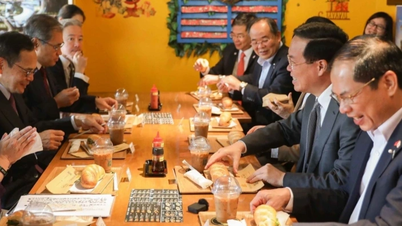

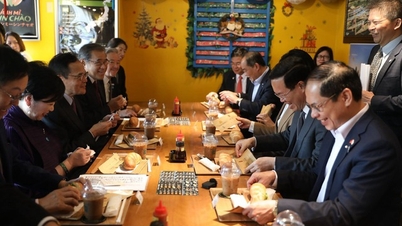
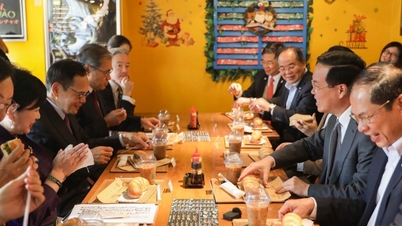





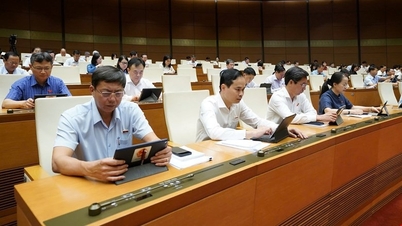
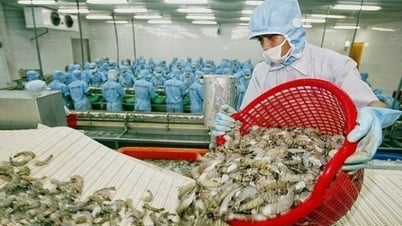










![[Photo] General Secretary To Lam receives leaders of typical Azerbaijani businesses](https://vphoto.vietnam.vn/thumb/1200x675/vietnam/resource/IMAGE/2025/5/8/998af6f177a044b4be0bfbc4858c7fd9)
































![[Photo] Prime Minister Pham Minh Chinh talks on the phone with Singaporean Prime Minister Lawrence Wong](https://vphoto.vietnam.vn/thumb/402x226/vietnam/resource/IMAGE/2025/5/8/e2eab082d9bc4fc4a360b28fa0ab94de)

















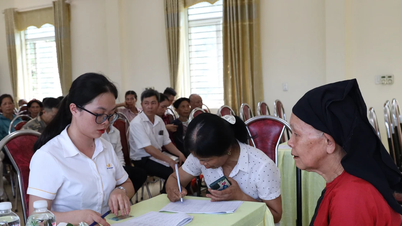















Comment (0)